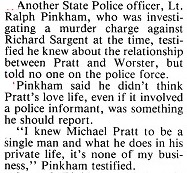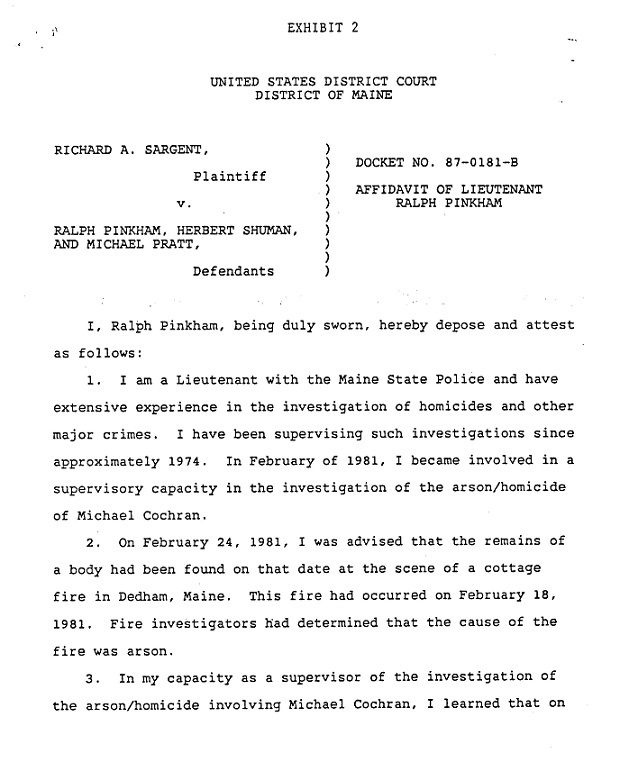
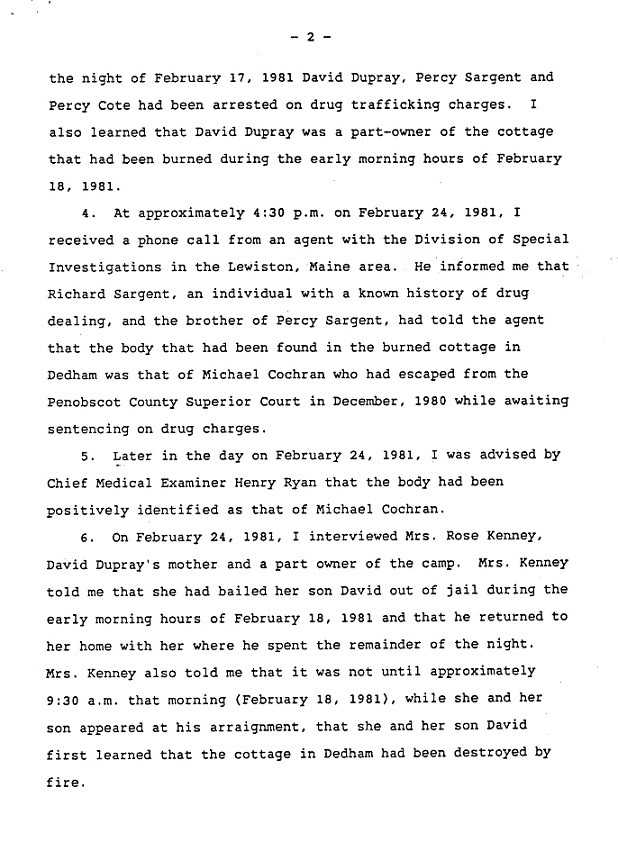
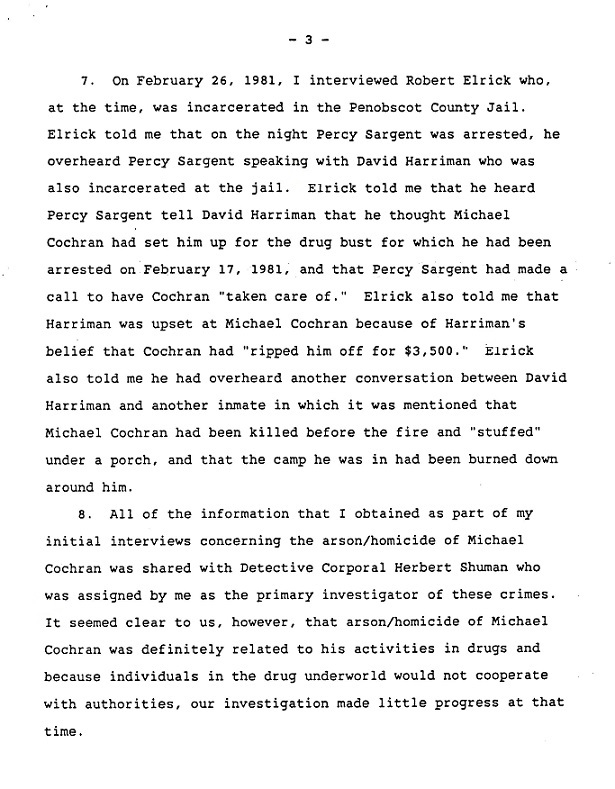
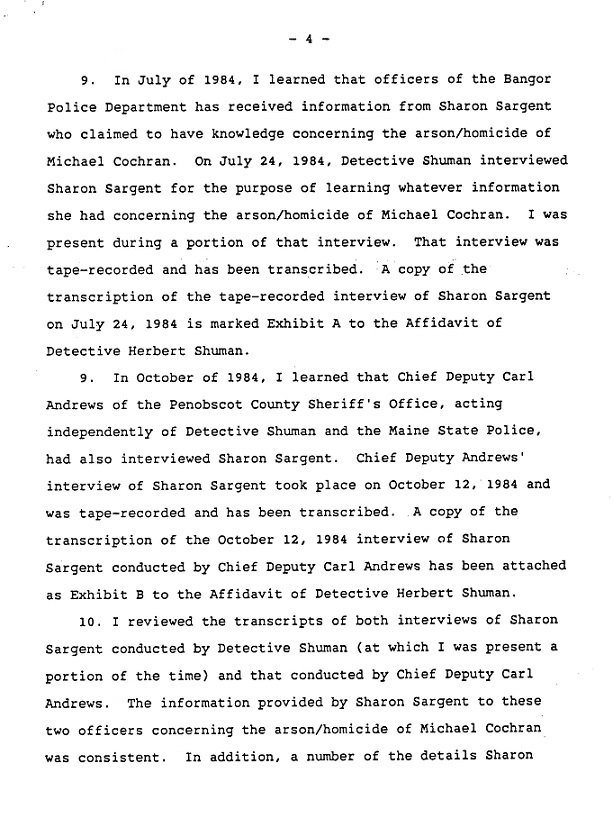
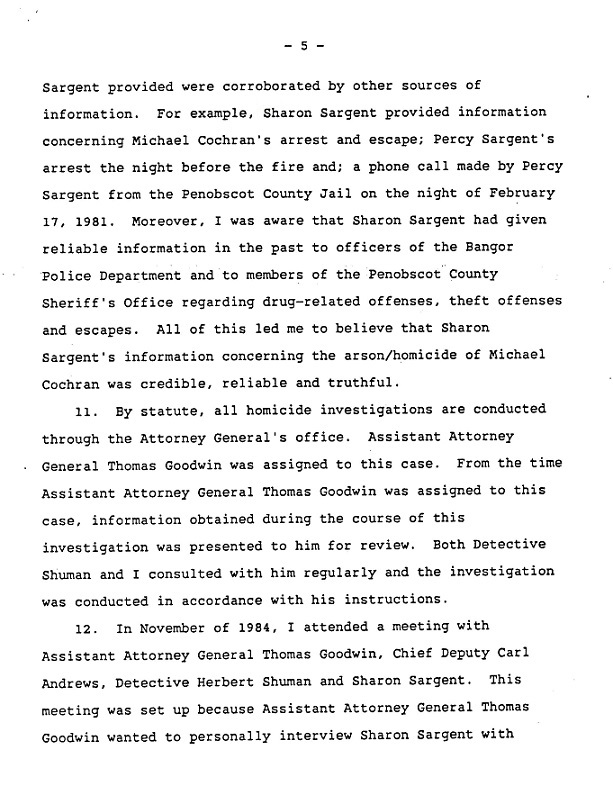
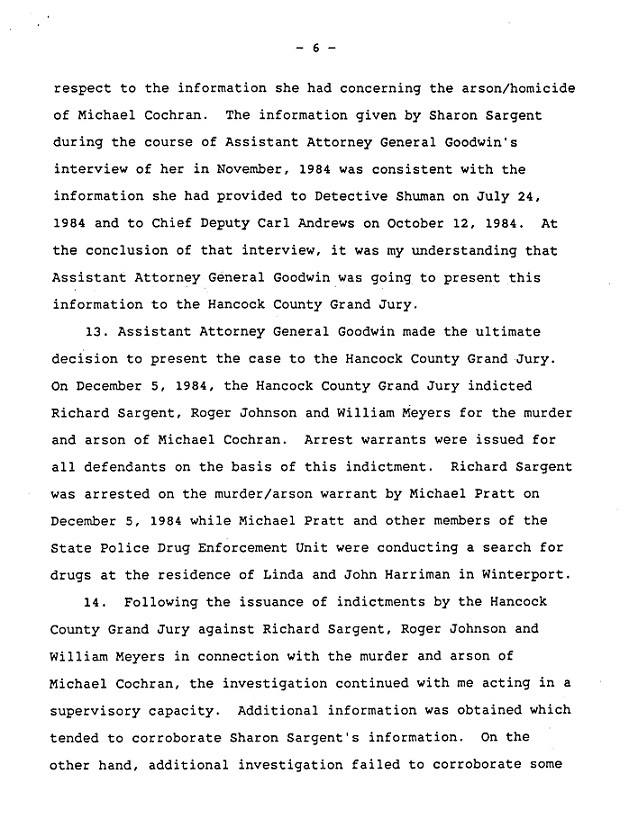
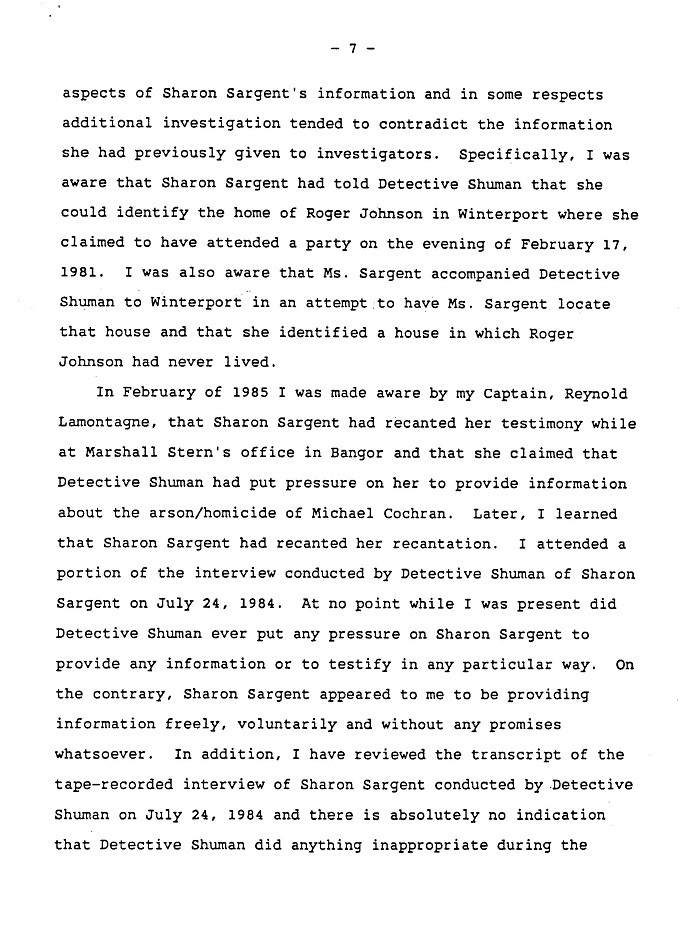
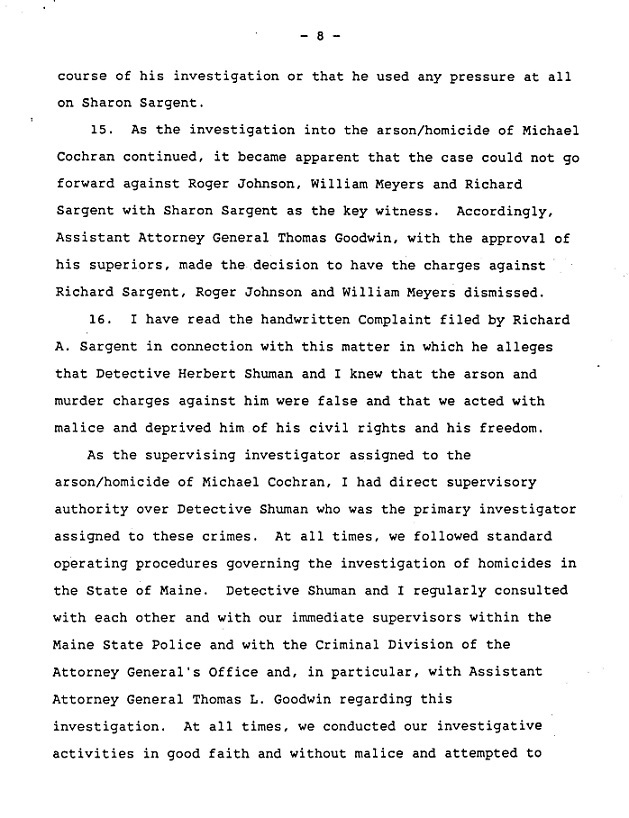
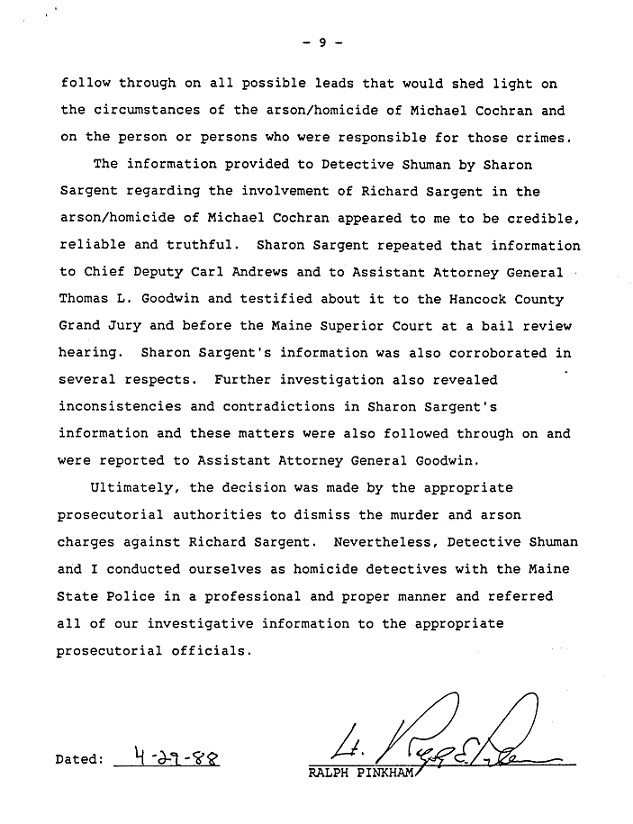
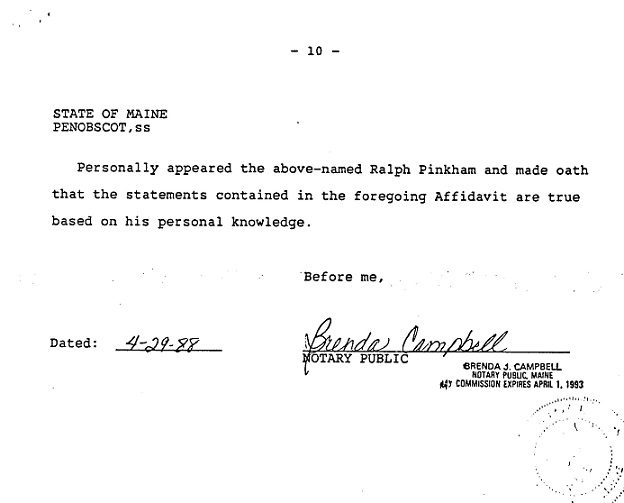
The Bangor Daily News reported that a Federal prosecutor resigned his position claiming that "dominance of the task force by the Maine State Police is compromising the potential effectiveness of the unit. Assistant U.S. Attorney Pasqual "Pat" Perrino said the "Maine State Police seemed more interested in playing a numbers game with small-time offenders to justify their existence rather than pursue cases involving large-scale significant drug dealers and financiers. So, the way Pinkham learned about the drug arrest of Percy Sargent, Percy Cote and David Dupray was from being involved in their arrest.
Pinkham says he got a call at 4:30 pm from a drug agent who told him that Richard Sargent had told him that the body found was Micheal Cochran. The authorities knew before the drug agent's call. DA Cox had dismissed Mike's escape on Feb. 24, 1981, the day Mike was found in the week-old fire rubble. I called DA Cox's office to ask what time the office closed for the day and was told that it closed at 4 pm.
Richard's information was one half hour after District Attorney David Cox’s office closed for the day. And according to MSP Cpl. Allen Jamison's report the medical examiner's vehicle didn't leave the murder scene until 4:40 pm. But yet, Cox dismissed Mike's escape because he was deceased before his office closed at 4 pm the day Mike's body was found. How did Cox know the unidentified body was Mike before the Medical Examiner’s vehicle left the murder scene with an unidentified body, according to what Shuman told the news. But at 5:45 pm, less than an hour, after Shuman left the murder scene he had Linda Gray, Mike's girlfriend, at the Bangor Police Dept for an interview. It wasn’t until one day later, Feb. 25, that Shuman arrived at Mike’s father’s place of employment seeking dental records for identification.
District Attorney Cox and the state police knew Mike was lying under the pile of fire rubble the morning he was murdered.
In Ryan's response he said "The identification of the deceased was made initially by the circumstances, the police suspecting who it was. The next item toward identification was the finding of the scar [Scar was identified as being on Mike's chest, it was at the base of his neck.] The scar was consistent with mediastinal lymph node biopsy. Such scars are unusual, especially in young people. This is routine practice as we endeavor, for the sake of the family and our own logistical problems to release bodies promptly based upon probability of identification. I have no idea if the word "positive” was ever used, but that is a relative term and not inappropriate in the face of the evidence developed.
Letters searching for identification of the body.
In August 2011, Derry called the Attorney General’s office and a meeting was scheduled for August 9 at the Maine State Police barracks in Bangor. He then contacted police informant, David Harriman, and had him come to my home to speak with us just before the MSP meeting. He didn’t want to be recorded. But, he did answer some questions.
One thing I asked Harriman about was what Det. Pinkham wrote in a statement he took from Robert Elrick's on Feb. 26, 1981 at the county jail. Pinkham wrote that "Harriman was also upset at Cochran because he thought that a few days before [Percy] Sargent's arrest that Cochran had ripped him (Harriman) off for $3,500."
Harriman said he had never met Mike and he did not say that to Percy Sargent.
In a statement Shuman took from David Dupray on the 24th , two days earlier. Shuman wrote that Dupray said “that he feels it was Percy [Sargent] that ripped off $3,800 that was in the trunk of his car.” Pinkham used Dupray’s Feb. 24 information about Percy Sargent ripping him off to denigrate Mike in Elrick's Feb. 26 statement.
Pinkham also said that Elrick overhead another conversation between Harriman and another inmate in which it was mentioned that Micheal Cochran was killed before the fire and stuffed under a porch and that the cottage was burned down around him. That does does not correspond with Dr. Roy's testimony that Mike died from smoke inhalation and there were no injuries to his body.
I find this very offensive. Mike was not so involved in the drug underworld that his murder could not be investigated. Mike's only drug arrest was when undercover drug agents with a search warrant entered an apartment he was living in with two other tenants and found two pounds of marijuana, assorted pills and paraphernalia with a street value of $2,000 according to the news. I am not condoning Mike's actions when I say this was his only drug arrest. I believe involvement in any amount of drugs is very dangerous to young people. It destroys their lives. It destroyed Mike's life. For Shuman and Pinkham to say Mike caused his own death is as low as they could go. There were people that should have been questioned but never were:
(1) Fire Inspector Wilbur Ricker stated that Lionel Cormier and Percy Sargent arrived on the arson/murder scene the morning he found Mike. He said he told Shuman that they need to be looked at along with the man seen fleeing into the woods. Percy Sargent and Lionel Cormier were never questioned. (2) Cormier and Paul Pollard arrived at Percy Sargent's mother's home about four hours after they killed Mike and told Percy's mother and sister that Mike's body would be found in a cottage fire. Neither Percy's mother nor sister were questioned. (3) Lionel Cormier, Paul Pollard and Percy Sargent borrowed Robert Smith's car to flee the state after Mike's body was found. Robert Smith was never questioned. (4) Percy Sargent and Lionel Cormier dropped Pollard off at Karen Murray's (Pollard's girlfriend) house in Rhode Island to hid. Karen Murray was never questioned. (5) While at Murray's residence Pollard called Owen Pollard (not his natural father) to tell him a man died. Owen told him to return home and they would take care of it. Owen Pollard was never questioned.
Rather than do an investigation of Mike's murder detectives Pinkham and Shuman slandered Mike and blamed him for his own death. Pinkham and Shuman obstructed justice.
Sheriff Carl Andrews interviewed Sharon while she was incarcerated in his jail and in that interview Sharon told a different story than she told the Bangor Police on December 5, 1983 and she told a different story when Shuman interviewed her on July 24, 1984. In Andrews' interview she accused William Myers of waiting for Mike at the courthouse and hiding him out until the time was right to kill him. Sharon told Andrews: "[T]he night that he escaped off the courthouse steps that was well planned ... there was somebody waiting for him. I’m not sure who it was, I’m not sure who Bubba [William Myers] sent but Bubba had that arranged. He was taken to the camp where he was well hidden and well concealed for ah, oh, awhile before he died. ... The reason being why he didn’t die right off or why the fire wasn’t set right off was because they needed to clear up, they need alibis." This was all fabricated.
Sharon made up ridicules stories about Mike's murder and the detectives accepted it as fact.
If the detectives had ever spoken with me I could have proved to them that Mike's girlfriend, Linda Gray, was the only person who helped Mike escape from the courthouse but they were not interested in anything I had to say.
Pinkham does not say that Sharon was incarcerated in Andrews' jail at the time he talked with her. Sharon later admitted that she was hoping for time off her sentence.
Pinkham says "For example, ... Sharon provided information concerning Michael Cochran's arrest and escape; Percy Sargent's arrest the night before the fire and; a phone call made by Percy Sargent from the Penobscot County Jail on the night of February 17, 1981." Pinkham doesn't say that Percy's phone call was to have Mike "taken care of" or that Percy Sargent was never questioned about that call. Furthermore, Sharon said Shuman gave her the information.
I know for a fact that Linda Gray, Mike's girlfriend, helped him escape from the courthouse. A report by the county sheriff says that when Mike was using the phone in the Clerk of Courts office that morning that his girlfriend was with him. Linda was with Mike every one of the 77 days that he was hiding. Linda told Shuman in her March 3, 1981 statement that Mike stayed in different places and she visited him every day. Why did the police never question Linda?
Linda told me during one of the times Shuman was interviewing her she asked him why he didn't follow her when she was travelling to where Mike was. She said he said I have more to do than follow you around. The first time I met Shuman he threatened me with charges for not turning Mike in to the authorities. I told him if I had known where he was I wouldn't have left him for six day under a pile of fire rubble.
Goodwin told me Pollard was in a back room and the reason he didn't hear Richard Sargent, Roger Johnson, and William Myers tramping through the cottage pouring gas was because he was deaf in one ear. That is not true. I listened to Pollard testify in court in July and August of 1986 and he heard every question that was asked of him without asking for it to be repeated. Did Goodwin not read the statements? Linda Gray said in her Feb. 24 and Mar. 3, 1981 statements that Pollard was on the couch in the living room and appeared to be asleep when she left the cottage after 12 o'clock on Feb. 18.
In 1987, the FBI investigated the Maine State Police for improper conduct. Drug Agent Michael Pratt arrested the three men Sharon Sargent said was guilty of Mike's murder. Pratt and Sharon Sargent was having an affair and when exposed they committed perjury. The news reported that Pinkham didn't think Pratt's love life, even if it involved a police informant, was something he should report.
